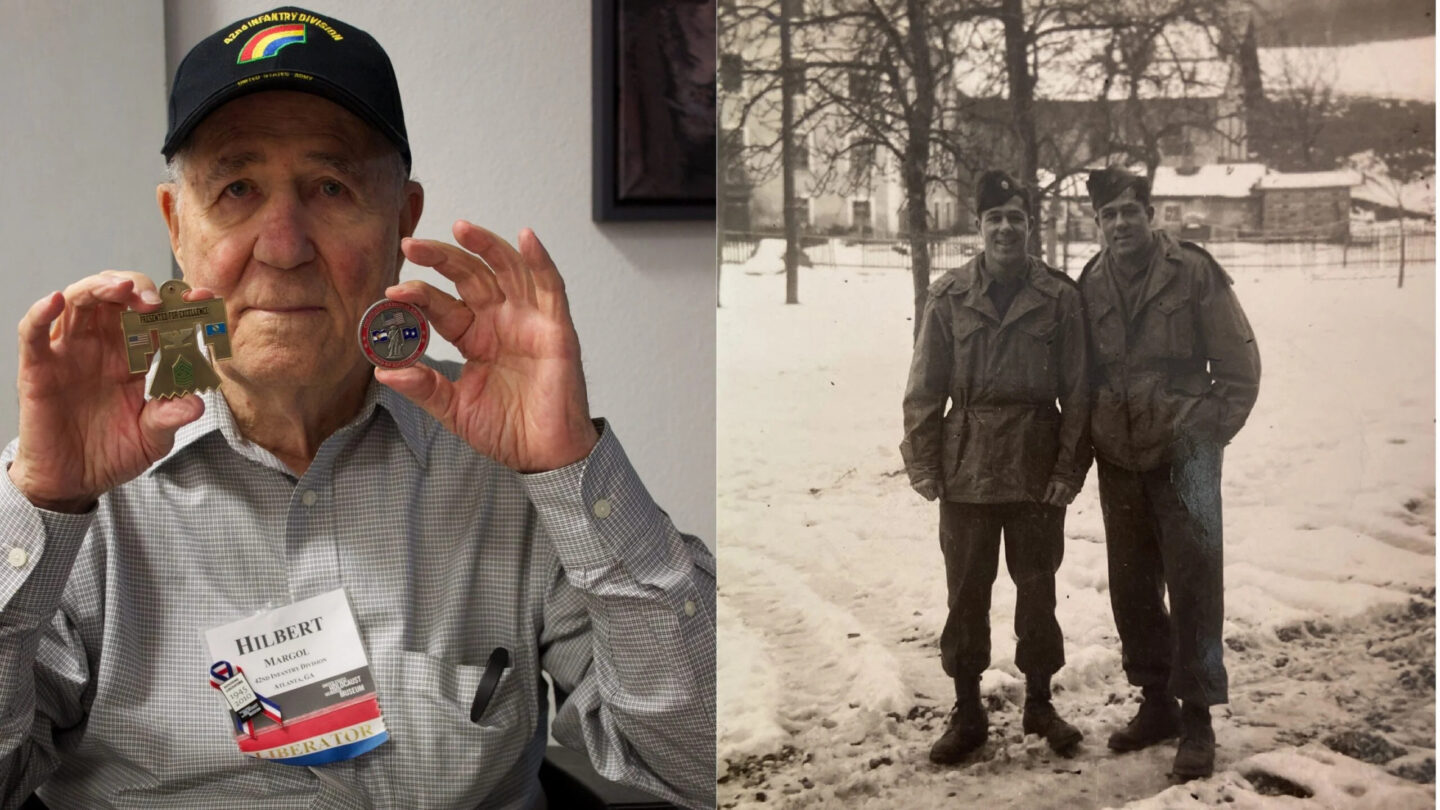It was early on April 29, 1945, and American troops pushed toward Munich, Germany, as World War II spiraled toward a protracted close. The 42nd Infantry “Rainbow” Division of the United States Army was moving along a two-lane road about 10 miles outside the city when two of its members — the Margol twins — asked permission from their sergeant to walk through the woods toward a site the troops thought was a chemical plant.
What the brothers found is etched indelibly into Hilbert Margol’s mind nearly 80 years later.
They had walked up to a parked train with its boxcars full of human remains.
“At the time, we knew what we saw, but we didn’t understand what we were seeing,” Margol recalled recently. “We didn’t know what happened, we didn’t know the story. And from there, we followed some infantry guys into what turned out to be the Dachau prisoner camp.”
The brothers turned suddenly and unwittingly into liberators that spring morning. Today, Margol’s persistence in telling this story means countless listeners from Atlanta and beyond have glimpsed, through his memory, a pivotal moment in human history that Margol wants to make sure they don’t forget.
‘An eyewitness’
And now, as he’s poised on the cusp of centenarian status, he has no plans to stop talking. Margol turned 99 on Feb. 22, and he keeps a full calendar of engagements — DeKalb high schools are among his stops — delivering an account he’s been refining for years. He met recently with Dennis Ruggiero’s students at St. Pius X Catholic High School in Chamblee, where Ruggiero teaches a class on the Holocaust and genocide.
“It goes from August to December, and it’s a course that is a history elective and it’s only for seniors. It’s a very popular course and it’s hard to get into,” Ruggiero explained to Decaturish recently.
His students, he said, received Margol’s account last October with a sense of gravity.
“They were moved,” Ruggiero said. “They knew that this was a special occasion. They wanted him to continue, but, obviously, the class only has a certain period and the bell does have to ring.”
Dennis Ruggiero (left) and Hilbert Margol after Margol’s presentation to Ruggiero’s class at St. Pius X Catholic High School in Chamblee. (Photo contributed by Dennis Ruggiero)
There’s no replacement for the accounts of Holocaust survivors — or liberators, Ruggiero said.
“I could talk about this to my students, we could see videos, we could read documents,” he said. “There’s nothing like touching history, and Hilbert is someone that, literally, you could go and shake his hand and you know that he was there. He was an eyewitness.”
Brothers together: A common thread
The fact that Hilbert and Howard Margol made their discovery side by side represented a common thread.
“As identical twin brothers, we were always extremely close and together,” Hilbert said.
As students at the University of Florida, they enrolled in the ROTC program before joining an active reserve unit and answering the call to active duty. Their mother facilitated their closeness during the war by going straight up the chain after they ended up in different divisions and Howard’s transfer requests were denied.
“She wrote a letter to President Roosevelt. Sure enough, a couple of weeks later, she got a response — a letter from the White House saying as a two-star mother, her request would be granted,” Hilbert recalled.
After training on U.S. soil, the two arrived in France just after the Battle of the Bulge. The brothers saw death along the way as the 42nd advanced into Germany, but the shock of it, Hilbert said, became routine as they fought. It was an experience he’d shelve for many years.
Their own story
When the brothers returned home, they set to work completing their degrees at the University of Florida, and together with an older brother, Melvin, they began a small business selling housewares door to door on credit in Jacksonville. That venture expanded to furniture, and along with some business partners they opened full-line furniture stores in Jacksonville and then Atlanta.
Howard moved to Georgia to manage operations here, and Hilbert and his wife, Betty Ann, followed some dozen years later; the couple has lived in the Dunwoody area since 1984.
When the Margol twins began sharing their story in earnest, decades had passed since their service. It just wasn’t something they were open about for a long time, and Hilbert has some of his own thoughts as to why.
“I never talked to anyone about my military experience — never told my wife, never told my children about any of it. It just wasn’t something to talk about,” he said. “I never talked about it because during the war … just about everyone I knew back home … was involved in the war effort in some way or another. They had their own stories to tell, so when we came home, (we) weren’t interested in listening to their stories and weren’t interested in telling them our stories.”
When they did decide to open up, the opportunities to talk began rolling in.
About 12 years ago, the brothers received official recognition as Dachau liberators at the United States Holocaust Memorial Museum in Washington, D.C. They gave an interview there.
“That sort of triggered it,” Hilbert said. “I came back to Atlanta, and one thing led to another and that started the first speaking engagements, and it took off from there … There’s been so many I can’t remember all of them. I stopped counting after 100.”
Although both brothers eventually spoke to such vaunted outlets as the History Channel and National Geographic, they gave their time generously to local groups ranging from school classes to government organizations. Howard passed away six years ago, and when he had become too ill to continue presenting, Hilbert carried on alone.
‘That’s what they were going through at our age’
Years ago, as he spoke to largely non-Jewish audiences at churches and civic organizations, Hilbert, who himself is Jewish, said he found many listeners simply didn’t understand the extent of the Holocaust atrocities. The dynamic feels different today when he addresses younger people, he said.
“Based on the questions (from earlier groups),” he said, “The message I got was that for the most part, they had heard about the Holocaust, but they knew absolutely nothing about details. That hasn’t been true more recently. Now, high school kids, the kind of questions they usually ask — more so than an adult audience — would be, ‘Well, when you went into Dachau and you saw these dead bodies, how did you feel, what did you think?’”
Sienna Trupiano and Andrew Oliver, both 18, are among the St. Pius X students who heard from Hilbert recently. Both seemed unsettled by portions of the presentation but grateful for the chance to hear it, and the fact that they are just a few years younger than the Margol twins were when they became liberators wasn’t lost on them.
“He told it so vividly, it felt like we could actually envision it ourselves, and it was very disturbing. I’m very glad that I heard it. I’m so thankful to be able to understand it and keep that story alive,” Trupiano said. “None of us were really thinking about it until he mentioned that he was around our age, and then it kind of just sank in, like, ‘Wow — that’s what they were going through at our age. I couldn’t even imagine right now.’ And then, it made it kind of like, almost sickening to think about if one of our friends was that person and had to experience that but also was that amazing and got to save that many people.”
The details and slides Margol presented were, at times, “a little grotesque,” Oliver said, but they brought the content of the class into technicolor.
“It kind of put everything we learned in those three or four months into perspective,” he said.
He remembers Ruggiero mentioning their guest’s age beforehand.
“When he told us how old he was, we really didn’t know what to expect,” Oliver said. “And then he (Hilbert) blew our whole class out of the water … I think what struck with us was how personable he was and how much he enjoys telling this story when I think most people wouldn’t want to talk about it. I think he thinks it’s important too.”
Hilbert, he said, shook every student’s hand as they exited the classroom after the presentation.
Presentations and appreciation
Hilbert and Betty Ann are looking now toward early November and their 75th wedding anniversary, and Hilbert has presentations lined up in the meantime. Ruggiero hopes to have him back to St. Piux X to talk to a WWII club.
Hilbert flatly insists he’s no hero. But as opportunities to hear from members of the Greatest Generation grow rarer, it seems his community holds his efforts in increasing regard; he’s certainly known at St. Pius X now. He attended a drama department play after speaking to Ruggiero’s classes, and attendees didn’t hold back in their appreciation.
“He didn’t know we were going to do this,” Ruggiero said. “So he’s in the audience, and all of a sudden after the play, our drama director gets up and basically says, ‘Ladies and gentlemen,’ We have a very special guest in the house — in our audience.’”
Hilbert stood up and received a two-minute standing ovation from the crowd.
“He was blown away,” Ruggiero said.
This story was provided by WABE content partner Decaturish.









